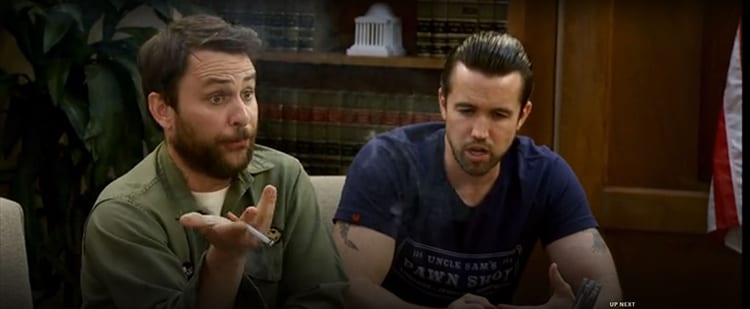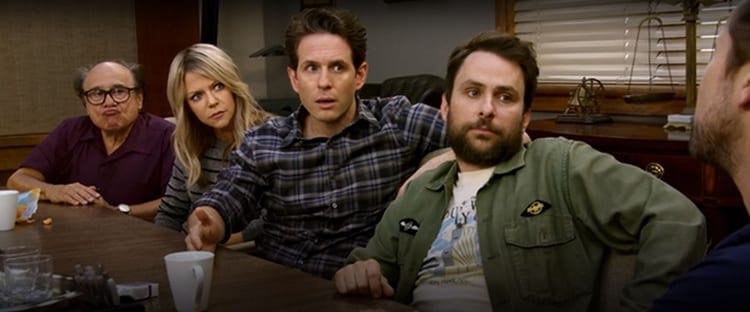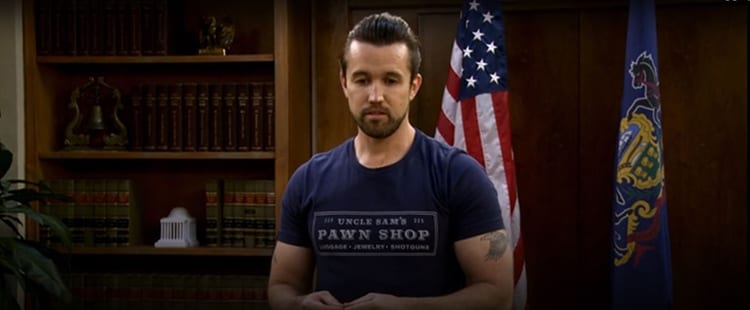If I had to pick my favorite live action sitcom of all time, I’d be pretty hard pressed to single one out. I have a ton of shows jockeying for the title, with Seinfeld, Community, NewsRadio, Cheers, Fleabag, and Schitt’s Creek all in the running, but if I could only watch one sitcom for the rest of my life I’d most likely chose It’s Always Sunny in Philadelphia.
When it premiered way back in 2005, it was awkwardly described as “Seinfeld on crack” (I have the DVD box art to prove it). Granted, that’s not a wholly inaccurate description, especially considering two of the main characters have struggled (infrequently) with crack addiction since the second season, but it doesn’t really express the vibe It’s Always Sunny strove for early on.
A lot of critics—as we are wont to do—felt the need to dissect the show’s intent. Many people felt It’s Always Sunny was trying to be shocking early on, tackling issues like racism and abortion right out of the gate. I, as a viewer, didn’t care about button and boundary pushing, I only cared that the show was funny, and that it respected its audience.
There are a lot of shows (Rick & Morty) that get pegged—often unfairly—as having a “toxic fanbase,” and surprisingly, Sunny never really fell into that category. The general consensus was that the characters were self-centered and awful—but also human and relatable—who often adhered to misguided philosophies and beliefs that were based on their character’s motivations and background. We didn’t agree with their positions, but we understood why they had them, and we could stand back and laugh at their ignorance. It was the classic “We’re laughing at them, not with them” debate that goes as far back as All in the Family, where most people got the point of the Archie Bunker character. Obviously, and realistically, art is going to be interpreted and misinterpreted and you can’t make any art of any value (in my own opinion) without the audience taking away different things from it.
As the show evolved, and times changed, things that were acceptable in the early days of Sunny soon became antiquated and no longer acceptable. They were not shy about using “The R-Word” and even had an early episode with it in the title. They phased out using the word over the years, as the discussion around the word changed.
In the episode “Paddy’s Pub: The Worst Bar in Philly” Sweet Dee refers to a critic (played by Fisher Stevens) as a “[homophobic slur]” for ordering a drink she didn’t deem “masculine” enough. These are all things modern Sunny would not do, and I wouldn’t want them to, at least not the context in which they were originally used.
This brings me to my absolute favorite Sunny episode of all time: “Hero or Hate Crime?” The episode opens with the gang all coincidentally hanging around the same part of town (a location set familiar to fans of Bones), as the intricate plot of the episode is foreshadowed to great effect. Dennis (Glenn Howerton) and Dee (Kaitlin Olson) are leaving a convenience store when a lottery ticket Dee has purchased flies out of her possession and lands underneath a precariously dangling piano. Mac (Rob McElhenney) and Charlie (Charlie Day) are walking down the street when Mac spots Dee’s runaway scratcher on the ground. Frank (Danny DeVito), who is standing on a nearby corner looking up women’s dresses with mirrors on his shoes, sees Mac pick up the ticket just as the rope holding the piano snaps. In a panic, he screams out, “Look out, [homophobic slur]!” causing everyone to look towards Mac (even a random kid holding a red balloon knows where to look). Charlie, quick to react, runs over and dropkicks Mac safely out of the way as the piano crashes down barely missing both of them.
As everyone converges to make sure Mac is OK, a discussion quickly starts as Mac is offended by the language Frank used, as it is hate speech. Frank disagrees, and claims he’s a hero and that he needed to use a word that would “cut through” in order to save his life.
Thus begins the plot of “Hero or Hate Crime?”, which revolves (mostly) around who has the rightful claim to the scratch ticket Mac holds. The episode itself is layered however with several different elements working together to form what I think is a perfect twenty-one and a half minutes of sitcom brilliance.
Television Taboos and Sunny‘s Own Past
The episode structure is one that the best episodes of Sunny always employ: put the five members of the gang in a set location and simply allow them to talk themselves in circles. They have decided to take their dispute over who has claim to the ticket to an arbitrator, since their in-house process often devolves into angry shouting, frequent filibustering, and refusals to yield (as noted in “Chardee MacDennis 2: Electric Boogaloo”).
Throughout the course of the episode they go through three different arbitrators (because they can’t agree on the terms they lay out), but the one they spend the most time with is a woman named Faith, played by Karen Y. McClain.
As is the case with most debates with the gang, they go off topic and lose the thread, which is why they are meeting with an arbitrator in the first place. One of my other favorite episodes (“Reynolds vs Reynolds: The Cereal Defense”) does this as well, going from attempting to solve a minor traffic dispute to devolving into a debate about evolution. Season 13 (probably the weakest season It’s Always Sunny has ever had due to the frequent absence of Glenn Howerton’s Dennis) had a classic episode—“The Gang Solves the Bathroom Crisis”—where they also try to “solve” an issue by taking whatever position suits themselves the best, even when their arguments are hypocritical and self-serving.
In “Hero or Hate Crime?” I noticed that they not only attempt to deal with the incendiary language they themselves have used in the past, but also several other words that other shows—and especially sitcoms—do not have the skill or nuance to even dare attempt to address.
When Frank claims he used the homophobic slur to “cut through,” Mac asks him what word he might use to describe Faith, an African American woman, should he need to “cut through.” This makes everyone very uncomfortable and Dennis suggests they move on before Charlie questioningly blurts out the racial slur everyone was so careful not to say.
“Whoa! Whoa! You can’t use that word, buddy!” Dennis says.
Charlie, attempting to clarify, says he was merely guessing what word he thinks Frank might have used. I can’t image (a mere couple of years removed from this episode) having a character, especially a white one, saying this line today. Yet, in the context of the episode, there was no way it could go unsaid.

This opens the floodgates for other words, as Frank asks if “[the C word]” is OK, saying the actual word bluntly. The guys have no problem with the word, with Dennis going so far as to say “[it’s] a good word,” while Mac says it’s really effective for when you want to make a woman feel small. The way Mac doesn’t see the hypocrisy of that is what makes his character who he is, as Mac has always been self-righteous and completely hypocritical about things that don’t adhere to his strict religious upbringing and worldview.
As the episode goes on, we even get one the first unbleeped instances of “f*ck” the show had ever uttered (outside of the “A Very Sunny Christmas” special, and the previous episode “Making Dennis Reynolds a Murderer” where a guest character is heard saying it off camera, while the on-camera captioning—the episode is done in the style of a documentary for most of it’s run time—censors the word) as well. It was like they were breaking down all the verbal taboos they could in one sitting. Sure, It’s Always Sunny had dropped both racial and homophobic slurs previously, and perhaps they were (as critics like to say) “reckoning” with their own “problematic” past, but they were doing it in a way pure Sunny excels: by letting dumb characters, with specious points talk it out amongst themselves.
Another thing of note is that several of the characters smoke in this episode. It’s a rarely discussed thing, but smoking has been mostly phased out of all TV shows. In early episodes of Sunny, we would see characters like Dennis smoking in the bar (back then it was legal), and this episode where Charlie, Dennis, Dee, Frank, and Faith all light up seems to be making a point about things you can—and can not do—on television, whether you are on FXX or not.
The fact that all these things are part of the narrative of the episode (Dee might have Parkinson’s and read smoking can help curtail it) is what makes their inclusion in the episode a testament to the writers (credited in this episode as Day, Howerton and McElhenney).
Fixing the Ending of “The Gang Goes to Hell: Part II”
At the end of “The Gang Goes to Hell: Part I,” Mac admits to the gang that he is gay. This is something that has (almost) always been heavily implied, and the gang openly acknowledged it for the first time as a group in the Season 9 episode “Mac Day,” but was never confirmed by Mac himself, as his character was always a devoted Catholic in denial about his sexuality.
The best part of this aspect of the show is that the gang has never cared about Mac being gay. In the aforementioned “Mac Day” we meet Mac’s cousin, “Country Mac,” who was gay, “loud and proud.” The gang found this refreshing and saw him as the antithesis to their own “City Mac” whose self loathing made him carry beliefs that God was a wrathful entity, rather than the loving, giving entity “Country Mac” saw them as.
However, at the end of “The Gang Goes to Hell: Part II,” Mac recants his statement that he’s gay, because God spared them all from drowning when the ship sunk. This was a bit of a disappointment to me, as I thought the matter-of-fact way Mac came to accept himself was nicely done after years of him twisting himself in knots to deny it.
“Hero or Hate Crime?” fixes this (and does a substantially better job) by addressing the fact that Frank thinks Mac is gay because, as Dennis tells the arbitrator, “Mac is gay.” Even the arbitrator is surprised that he doesn’t acknowledge it. As is the case with these types of episodes, the gang is then compelled to move away from the ticket dispute and shift focus towards proving that Mac is indeed gay.

Dennis does this by getting “the bike in the basement.” We, as the audience, were not aware of any such bike before this episode. The bike, which looks like a normal exercise bike, has been “modified” by Mac to have a dildo protrude through the bike seat as you pedal. He argues that this is not a penis, but in fact a fist, simply preventing the user from resting on the seat and motivating the user not to sit. The whole scene is brilliantly edited, and the blocking (especially the reveal of the modified bike seat) are perfectly executed. Done differently, this scene could have come off mean-spirited.
A Perfect Ending
When the third, and final, arbitrator decides that the ticket only rightfully belongs to Mac if he identifies as gay, he quickly signs a legal document saying he’s gay. This annoys the gang, especially Dennis who claims “There’s a history to this!” because Mac is basically coming out based on a technicality. If Mac came out this way, it would be a very cheap way to have him come out without truly coming out (for the characters, and the show itself).
However, as Mac signs the paper triumphantly, and everyone acquiesces and complains that he’ll immediately go back in the closet, something unexpected and wonderful happens. You can hear the volume of everyone (ever so subtly) fade out as Mac suddenly decides in that moment, “I dunno, maybe I’ll stay out.” Dennis, although increasing annoyed with Mac as the years have gone on, politely tells him he doesn’t have to, but Mac sticks to what he said. “No, I think I’m out now, yeah, I’m gay.” He seems truly at peace with the decision. He even let’s out a wonderful, cathartic sigh of relief, as he pushes his bike out of the room (as the dildo continues to pop in and out with perfect comic timing, a credit to the episode’s director, Jamie Babbit). It’s a moment that is genuinely moving. I’m not someone who gets emotional watching fiction, but I fully admit I was completely surprised by how affected I was by that moment. I thought it was beautiful.

It’s Always Sunny in Philadelphia finally tackled the topic of Mac’s sexuality, and most importantly, they did it through brilliant storytelling (the structure of the ticket claim story alone is fantastic) and humor. They didn’t forget the main thing, which is something I found a later episode dealing with Mac’s sexuality, “Mac Finds His Pride,” to be sorely lacking. While that episode must have surely been a moving and powerful message to people who struggle to come out to their loved ones, and to simply accept and love themselves, the episode exited the realm of comedy, and went straight into heavy drama. While I know that episode meant a lot to people (and it was a personal decision for McElhenney, himself), I couldn’t help but find the episode severely out of place. Not to mention the episode just isn’t funny, and the side plot with Frank, Charlie, and Cricket being devoid of any laughs made the entire episode (the 13th season’s finale) an odd way to end things.
“Hero or Hate Crime?” ends perfectly, with the gang sincerely happy for Mac, while Dennis is quick to say he still hates Mac, saying, “It’s not a gay thing, it’s a Mac thing.” Everyone agrees. Yeah, it’s a Mac thing.

